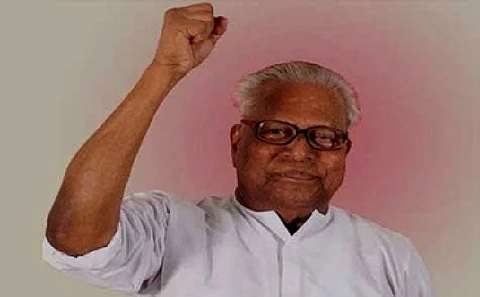

# Ajayan | A mind tempered in flame, a tongue unbent by compromise, Velikkakathu Sankaran Achuthanandan, the last red sentinel, bore a name that began with submission within a fence but lived defiantly outside the fence. As CPI(M)’s lone surviving founder, he stood as the final bastion of unyielding idealism, watching the party drift while he, exiled by elevation, became the conscience it tried to forget.
The centenarian who wore unyielding ideology like skin will be mourned by a Kerala that knew the correcting force in him, one that revisionists dreaded most. Years ago, when his rising star unsettled the party's throne, Pinarayi Vijayan flung a poetic jibe — a child baffled by the roaring sea and collecting its water in a bucket, but not seeing the roar of waves in it. But VS, ever the cryptic oracle, returned fire with frost: What if the sea itself dries up, Gorbachevs in tow? — a chilling reminder of a man who had a no meagre role in the red tide of Soviet Union retreat.
Yet another flicker of envy cloaked in discipline was when chants for VS surged at a party meet, unsettling the orchestration of control. Pinarayi, unable to mask his ire, likened the moment to the frenzy for pop icon Usha Uthup. To the proletariat, it reeked not of wit, but of wounded pride like someone grasping at metaphors to dim a legacy too luminous to ignore.
VS's tongue, ever barbed, ever brave, often wrote cheques the party preferred not to cash. The first reckoning came in 1962, during the Chinese aggression, when he was jailed. But even behind bars, defiance flowed: he rallied fellow inmates to donate blood for Indian soldiers. A stark contrast to the CPM’s own doyen, EMS Namboodiripad, who mused that China merely fought for land it claimed as its own, just as India did. While the party wavered in nuance, VS stood unshaken; patriotism over party line, and courage over convenience. In a party once joked about unfurling umbrellas in Kerala if it rained in Peking (now Beijing), the leadership decided to cast him down from the Central Committee to the humblest rung — the branch committee. Other leaders who faced action then included OJ Joseph and K Anirudhan among 10 leaders.
The last of the actions was after the tiff with the other politburo member Pinarayi.
Another scar on VS’s rebel skin came with the party’s public censure during the infamous vettinirathal episode he led when saplings planted on agricultural lands were removed. The episode, etched in red memory, now haunts a leadership that, without VS, diluted wetland and paddy field protections. Nature, unlike party comrades, held no grudges. And today, even a passing rain drowns the State, as if mourning the sidelining of the one who warned against tearing roots from earth, his Munnar mission stands tall.
At the 1998 Palakkad party State conference, where Pinarayi’s ascent began, the ever-unyielding crusader VS unsheathed his words against the CITU brass, hurting the bigs MM Lawrence and KN Raveendranath. The fire he lit scorched deep and struck back with censure for stoking factionalism. Ironically, the same brush was used against VS and his long-standing rival, Pinarayi, over a decade later. Stern against global funding, VS stood firm against Asian Development Bank funding which he argued was tied loan. But the party leadership which had by then started drifting away decided to censure VS.
The shadow of the SNC Lavalin graft case, still trailing Pinarayi like an unshakable spectre with central blessings, fell heaviest on VS. When he, true to form, refused to don the cloak of silence at a press conference, choosing conscience over camaraderie, Pinarayi struck back with a swift counter-attack. The fallout was seismic: both titans were ejected from the politburo by a central leadership desperate to dam the rising rift. Yet history played favourites; Pinarayi clawed his way back; VS, the party’s inconvenient conscience, remained in exile till his final breath.
That VS was the party’s inconvenient conscience became clear when the streets, not the leadership, spoke for him. Denied a ticket by the CPI(M), the outcry from the faithful forced the high command to relent, finally crowning him Chief Minister. Yet even in power, the reins were clipped. He was denied the Home portfolio, a leash the party quietly removed when Pinarayi ascended. Insiders whisper about a strategy of sabotage where a dozen-odd weak candidates were handpicked to ensure the party fell just short, and with it, VS’s return for a second term.
When public fervour once again lifted VS to the campaign frontline, the party draped him in the colours of a mascot. As the people cheered and voted, the chair of Chief Minister was quietly passed to Pinarayi. VS was cast aside to helm the Administrative Reforms Committee, a move dismissed by detractors as proof of his 'hunger for power'. But those who knew the man knew better knew that it was a quiet coup. Every file would pass his desk, every flaw laid bare. His final report, still gathering dust, held within it a blueprint to unshackle governance from the grip of party and service syndicates.
In his final years, age, relentless and unkind, drew the curtain slowly on VS’s public life. Yet in his silence, his absence thundered, felt more with each misstep of a leadership drunk on convenience and stripped of conviction. As the party wades through public ire, rudderless and unmoored, the void he left gapes wider. Had the quiet understanding between VS and Yechury endured, perhaps the drift from ideals would have met resistance. But with both gone, the decay is writ large. Red salute to the one who stood tall, unbent, unsold, while pygmies strut in borrowed robes and stumble in shadows too large to fill.
